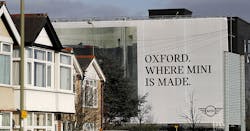BMW Chooses UK Plant for Electric Mini Despite Brexit Risk
the Mini compact car at its factory in Oxford, England, choosing the U.K. site over alternatives in Germany and the Netherlands despite risks associated with Brexit.
Production of the battery-powered Mini will start in 2019, BMW said Tuesday in a statement. The plant will make the car until at least 2023, a person familiar with the decision said.
With the move, BMW joins tech companies in investing in Britain ahead of the country’s departure from the European Union, even as investment banks relocate some operations. Amazon.com Inc. is expanding its new U.K. headquarters to support the growth of its Prime Video service in Europe. The world’s largest online retailer will occupy all 15 floors of a newly constructed tower on the edge of the City of London, after initially planning to take only 11.
Vote of Confidence
BMW’s “landmark decision is a vote of confidence in the determination of our industrial strategy to make Britain the go-to place in the world for the next generation of vehicles,” U.K. Business Secretary Greg Clark said in a statement. “The automotive industry is a great British success story,” and “we want to see the sector continue to innovate and grow here.”
Selecting the production site for the e-Mini has been particularly complex because of competing political and economic pressures amid government negotiations over Brexit. If a trade agreement proves unfavorable, components from Germany could face tariffs, making the project less viable. Assigning the model to Mini’s main plant would ease tensions with U.K. officials, who have been lobbying heavily for the marquee project.
The new vehicle will be based on the underpinnings of Mini’s core 3-door model, with drivetrain components coming from BMW plants in Dingolfing and Landshut, Germany, the carmaker said.
Four-Year Run
The relatively short time frame for the production run for the model -- four years, compared to the typical seven -- gives BMW the opportunity to shift the car elsewhere with the next revamp of the vehicle if necessary, said the person familiar with the decision, who asked not to be identified because the information isn’t public.
The battery-powered Mini variant marks a critical expansion of the Munich-based manufacturer’s electric-car lineup as it prepares for tougher EU environmental rules being phased in starting in 2020. The e-Mini will be BMW’s first all-electric model since the namesake brand’s i3 was introduced in 2013. The battery-powered urban car has struggled with tepid sales because of its odd design, relatively high price and limited range.
While most Mini vehicles are built in Oxford, BMW has said it could move output elsewhere if Brexit turns out unfavorably. Some of the urban brand’s models are already produced in the Netherlands. BMW facilities in the German cities of Leipzig, where the i3 is produced, and Regensburg were also among candidates to assemble the electric Mini.
BMW has owned the British nameplate for about two decades. Since 2000, the German carmaker has invested about 1.75 billion pounds (US$2.3 billion) in its U.K. manufacturing operations, which also include sites in Swindon and Hams Hall, England. Including the Rolls-Royce marque, BMW employs about 18,000 people across the U.K., including 4,000 at the Oxford plant, and exports 2.4 billion pounds of vehicles and parts from the country annually.
By Elisabeth Behrmann
About the Author
Bloomberg
Licensed content from Bloomberg, copyright 2016.
